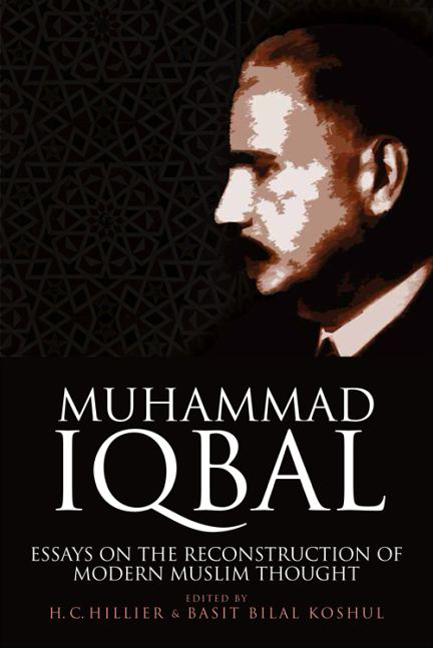Book contents
- Frontmatter
- Contents
- Preface
- 1 Introduction
- 2 The Human Person in Iqbal's Thought
- 3 Achieving Humanity: Convergence between Henri Bergson and Muhammad Iqbal
- 4 The Contemporary Relevance of Muhammad Iqbal
- 5 Pragmatism and Islam in Peirce and Iqbal: The Metaphysics of Emergent Mind
- 6 Between Hegel and Rumi: Iqbal's Contrapuntal Encounters with the Islamic Philosophical Traditions
- 7 Reconstructing Islam in a Post-metaphysical Age: Muhammad Iqbal's Interpretation of Immortality
- 8 Iqbal, Bergson and the Reconstruction of the Divine Nexus in Political Thought
- 9 Muhammad Iqbal: Restoring Muslim Dignity through Poetry, Philosophy and Religious Political Action
- Index
9 - Muhammad Iqbal: Restoring Muslim Dignity through Poetry, Philosophy and Religious Political Action
Published online by Cambridge University Press: 10 October 2017
- Frontmatter
- Contents
- Preface
- 1 Introduction
- 2 The Human Person in Iqbal's Thought
- 3 Achieving Humanity: Convergence between Henri Bergson and Muhammad Iqbal
- 4 The Contemporary Relevance of Muhammad Iqbal
- 5 Pragmatism and Islam in Peirce and Iqbal: The Metaphysics of Emergent Mind
- 6 Between Hegel and Rumi: Iqbal's Contrapuntal Encounters with the Islamic Philosophical Traditions
- 7 Reconstructing Islam in a Post-metaphysical Age: Muhammad Iqbal's Interpretation of Immortality
- 8 Iqbal, Bergson and the Reconstruction of the Divine Nexus in Political Thought
- 9 Muhammad Iqbal: Restoring Muslim Dignity through Poetry, Philosophy and Religious Political Action
- Index
Summary
Introduction
The poet Muhammad Iqbal perceived an attack on the dignity of Muslims as a result of the occupation and exploitation of his Indian homeland by British Imperialism. His doctrine of the Perfect Man, incorporating his philosophical and religious views, was his prescription for the restoration of that dignity that he effectively communicated through his popular poetry. Iqbal worked for nearly thirty years to achieve political change in his native India. Yet he did not work entirely in the political arena as a Gandhi or a Nehru, instead choosing to communicate his ideas through the less obvious means of his poetry. The power and effectiveness of his approach evades the Western mind, accustomed to more direct means of political activism. Yet Iqbal's approach was perfectly suited for his culture, which continues to hold the poet and his thought in high esteem. This chapter presents a history of ideas and interdisciplinary treatment of Iqbal's work, providing an analysis of the philosophical, political, and religious influences in a cultural context that shaped both the man and his message into the Poet of Muslim Dignity – a message that continues to resonate with contemporary Muslims.
In this chapter, I will first describe the challenge to the dignity of the Muslims in British India as perceived by Iqbal. Second, I will describe his prescription to restore Muslim dignity, the khudi-empowered Perfect Man. Finally, I will elucidate Iqbal's pan-Islamic message and activism that he hoped would bring about the fulfilment of his vision and the restoration of Muslim dignity.
The Humiliation of Muslims in British India
Muhammad Iqbal looked deeply into the soul of India and discerned a wound that required the ministrations of his unique perspective. His analysis discerned that the dignity of India's Muslims had been deeply compromised by British colonialism, with both national and global implications. It is important to understand that his Muslim faith was born in the deserts of the Arabian Peninsula and arose from what has been characterised by anthropologists as an honour-based culture.
- Type
- Chapter
- Information
- Muhammad IqbalEssays on the Reconstruction of Modern Muslim Thought, pp. 201 - 234Publisher: Edinburgh University PressPrint publication year: 2015

